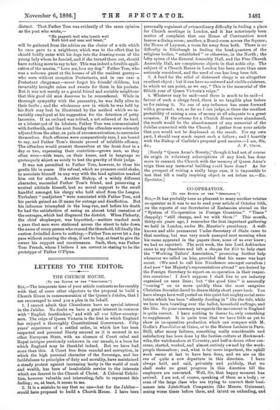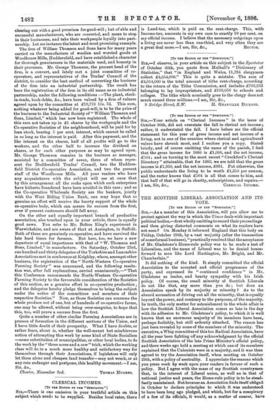CO-OPERATION.
[To TEL EDITOE Of TEL " SPECTAX011."] SIR,—It has probably been as pleasant to many another veteran co-operator as it was to me to read your article of October 30th, on the reports of our Secretaries of Embassies abroad on the "System of Co-operation in Foreign Countries." "Times" (happily) " still change, and we with them !" This month, thirty-six years ago, I remember the first important gathering we held in London, under Mr. Manrice's presidency. A well- known and able permanent Under-Secretary of State came to that meeting, but was very much annoyed next morning when his name appeared in the papers (how, none of us ever knew; we had no reporter). The next week, the late Lord Ashburton came to my chambers and left a cheque for £50 to help start the "Working Tailors' Association," promising further help whenever we called on him, provided that his name was kept secret. (We used to call him Nicodemus amongst ourselves.) And now " her Majesty's representatives abroad " are desired by the Foreign Secretary to report on co-operation in their respec- tive countries ! I don't suppose I shall live to see industry organised on sane lines ; but " the good time " is assuredly " coming " on us more quickly than the most sanguine Christian Socialist dared to dream thirty short years back. You have always been well posted on this quiet but mighty social revo- lution which has been " silently flooding in " like the tide, while we have been brawling over the ballot, household suffrage, and the like. So your summary as regards the movement in England is quite correct. I have nothing to demur to, only something to supplement. It is quite true that we have little as yet to show in co-operative production which can compare with M. Godin's Famillaters at Guise, or to the Maison Leclaire in Paris. Still, after many failures, something really considerable and satisfactory has been done by the fustian-cutters at Heckmond- wike, the watchmakers at Coventry, and half-a-dozen other con- cern9, started, worked, and almost entirely owned by the work- people themselves ; and, what is far more important, the uphill work seems at last to have been done, and we are on the eve of quite a new departure in this direction. I have always held, and said, privately and publicly, that we shall make no great progress in this direction till the employers are converted. Well, Sir, that happy moment has arrived. I am not, of course, speaking of them as a body ; or even of the large class who are trying to convert their busi- nesses into Joint-Stook Companies (like Messrs. Guinness), seeing worse times before them, and intent on unloading, and clearing out with a good premium for good-will ; but of able and successful manufacturers, who are converted, and mean to stop in their businesses, and take their workpeople loyally into part- nership. Let me instance the latest and most promising example. The firm of William Thomson and Sons have for many years carried on the manufacture of woollen and worsted goods at Woodhouse Mills, Huddersfield, and have established a character for thorough genuineness in the materials used, and honesty in their processes. Mr. George Thomson, the present head of the firm, is a convert, and lately met a joint committee of co- operators, and representatives of the Trades' Council of the district, to consider the best method of converting the business of the firm into an industrial partnership. The result has been the registration of the firm in its old name as an industrial partnership, under the following conditions :—The plant, stock- in-trade, book-debts, &c., have been valued by a firm of valuers agreed upon by the committee at £19,718 15s. 7d. This sum, nothing whatever being added for good-will, is to be the price of the business to the Industrial Society of " William Thomson and Sons, Limited," which has now been registered. The whole of this sum not taken np in £1 shares by the workpeople and the Co-operative Societies of the neighbourhood, will be paid for by loan stock, bearing 5 per cent. interest, which cannot be called in so long as the interest is paid. After this payment, and the like interest on the shares, half of all profits will go to the workers, and the other half to increase the dividend on shares, or for such other purposes as may be agreed upon. Mr. George Thomson remains in the business as manager, asssisted by a committee of seven, three of whom repre- sent the Huddersfield Trades' Council, two the Hudders- field District Co-operative Association, and two the present staff of the Woodhouse Mills. All your readers who have any acquaintance with the subject will see at once that by this arrangement all the rocks upon which such enterprises have hitherto foundered have been avoided in this case ; and as the Co-operative Wholesale Society are the bankers, jointly with the West Riding Union Bank, one may hope that so genuine an effort will receive the hearty support of the whole co-operative body, which can assure its success from the first, even if present customers should fall away.
On the other and equally important* branch of productive association, also touched upon in your article, there is equally good news. You refer to Mr. Bolton King's experiment in Warwickshire, and are aware of that at Assington, in Suffolk. Both of these are genuinely co-operative, and have survived the late hard times for farmers. But here, too, we have a new departure of equal importance with that of " W. Thomson and Sons, Limited," in manufacture. On Saturday, October 23rd, one hundred and thirty delegates of the Yorkshire and Lancashire Associations met in conference at Keighley, where, amongst other business, the registration of the " North-Western Co-operative Farming Society" was announced, and the following resolu- tion was, after full explanations, carried unanimously,—" That this Conference recommends the North-Western Co-operative Farming Society to the favourable consideration of the Societies of this section, as a genuine effort in co-operative production ; and the delegates hereby pledge themselves to bring the subject under the notice of the committees and members of their respective Societies." Now, as those Societies can consume the whole produce not of one, but of hundreds of co-operative farms, one may be allowed, without being over-sanguine, to hope that this, too, will prove a success from the first.
Quite a number of other similar Farming Associations are in process of formation in the different sections of the Union, and I have little doubt of their prosperity. What I have doubts, or rather fears, about is, whether the well-meant but mischievous notion of attempting this work by some kind of State Socialism —some substitution of municipalities, or other local bodies, to do the work by the "three acres and a cow" trick, which the working class will do in a much more healthy and satisfactory way for themselves through their Associations, if legislators will only let them alone and cheapen land transfer—may not wreck, or at any rate endanger and postpone, this healthy movement.—I am, Sir, &e.,















































 Previous page
Previous page